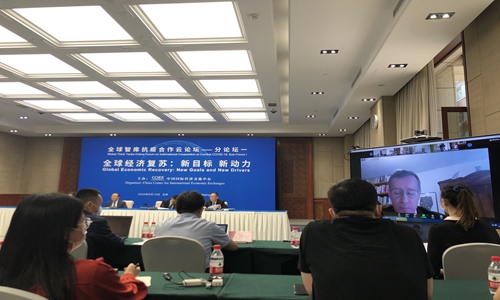
An online-offline forum on global economic recovery is held in Beijing on Wednesday. It is one of the sub-forums of the Global Think Tanks Online Forum on International Cooperation to Combat COVID-19 held on Tuesday and Wednesday. Photo: Zhang Hongpei/GT
As the world economy faces a downturn caused by the COVID-19 pandemic that could be even worse than the Great Depression of the 1930s, officials and experts in global think tanks are calling for joint international efforts to help the economic recovery.
Chen Wenling, chief economist at the China Center for International Economic Exchanges (CCIEE), told an online-offline forum on global economic recovery on Wednesday that there are five waves coming to the world economy: recession, bankruptcy, unemployment, disruption of supply chains, and the release of more cash into the market.
"Many countries' monetary policy space has been severely squeezed," Chen said.
"Unprecedented difficulty needs unprecedented cooperation instead of confrontation," she noted.
The World Bank said Monday that the COVID-19 pandemic will shrink global GDP by 5.2 percent in 2020, the deepest global recession in eight decades, despite unprecedented policy support. Although a moderate recovery is envisioned in 2021, with global growth reaching 4.2 percent, output is not expected to return to its previously expected levels.
The forecast is even gloomier than that of the IMF, which in April said that the global economy is expected to shrink by 3.0 percent during 2020 in a coronavirus-driven collapse of activity that will mark the steepest downturn since the Great Depression of the 1930s.
The COVID-19 health crisis has had a big impact on global investment. Analysis released by the United Nations Conference on Trade and Development (UNCTAD) on March 26 showed that the downward pressure caused by COVID-19 on foreign direct investment flows could range from minus 30 percent to minus 40 percent during 2020-2021, much worse than previous projections of minus 5 percent to minus 15 percent.
The progress of globalization via free trade and investment under the principle of multilateralism should be maintained, especially against the backdrop of the pandemic, officials and experts said.
Former prime minister of Japan Yukio Hatoyama said in a recorded video during the forum that China and the US, the world's two largest powers, should conduct constructive dialogue in the post-COVID-19 period to contribute to the world's economic recovery.
Hatoyama also suggested the vision of establishing the East Asian Community, which is centered on China, Japan and South Korea. And joint efforts to combat the COVID-19 pandemic are also needed, he said.
China and the US should end the intensifying tensions as soon as possible and get back on the track of cooperation via which they can share experience in fighting the virus, said Stephen Roach, a professor at Yale University.
The global economy may show a W-shaped growth path instead of a V-shaped rebound, and the recovery process will experience twists and turns as the pandemic weighs on both supply and demand, Roach said.
As the first country to walk out of the COVID-19 mire, China is expected to play an active and leading role in driving the recovery of the world economy.
China, which achieved 6.1 percent GDP growth in 2019, is now projected to have growth of 1 percent in 2020, one of the few countries that could register positive growth, according to the World Bank report. It projected a sharp rebound of 6.9 percent growth for China in 2021.
According to the IMF, China will maintain positive growth of 1.2 percent in 2020 and its GDP growth is forecast to grow 9.2 percent in 2021.
Foreign experts expressed the expectation that China-proposed multilateral frameworks like the Belt and Road Initiative (BRI) and the Asian Infrastructure Investment Bank could provide solutions for the virus-ravaged world trade and economy.
The BRI has been contributing actively to the resumption of economic activities in developing countries, Mustafa Hyder Sayed, executive director of the Pakistan-China Institute, said online during the forum.
He offered the example of the China-Pakistan Economic Corridor, a flagship project in the BRI, saying that it has created many employment opportunities in Pakistan and promoted the country's cement and steel industry.
"The Maldives and Bangladesh are also advancing their BRI projects, and the implementation of the projects has helped restore the local economy amid the epidemic," he noted.



